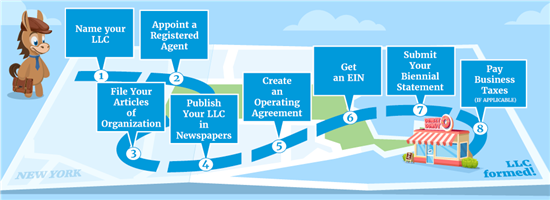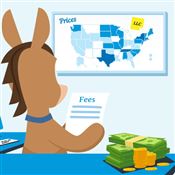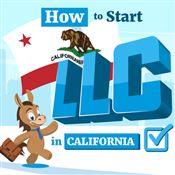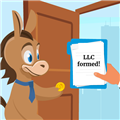How to Start an LLC in New York
Ad Disclosure: This article contains references to products from our partners. We may receive compensation if you apply or shop through links in our content. This compensation may impact how and where products appear on this site. You help support CreditDonkey by using our links.
Every state has different rules when it comes to starting an LLC. Find out how it works in New York and what you need to do to start one. Read on.
 |
New York enforces strict regulations on businesses in the area. They often charge expensive penalties for violations.
That's why you need to familiarize yourself with the process if you want to start an LLC here. Especially since the requirements may differ in other states.
So, how does starting an LLC in New York work? What do you need to create one?
We've got your back in this article.
How to Start an LLC in New York?
 |
We've nailed down the details of New York's requirements. You can start your LLC in 8 straightforward steps.
Here's what to do first:
1. Name your LLC
Before you can file your formation documents, you need to choose a business name. Preferably something that represents your brand and customers can easily recall.
But it can be anything you want. Just make sure that whatever name you choose follows the state's guidelines.
Here are New York's LLC name requirements:
- It should include words that indicate it's an LLC (like LLC, Limited Liability Company, or L.L.C.)
- It should be unique and can't be confused with other registered companies in the state
- It shouldn't imply an association with any government agency or department
- It cannot be confused with any government agency or department
New York also restricts certain words and phrases. And in some cases, you might need the approval of other state agencies for specific business names.
You can verify if your preferred LLC name is still up for grabs by searching the state's Corporation and Business Entity Database. You can also call the New York State Department's Division of Corporations at (518) 473-2492 if you need extra help. Take note that they charge a $5 search fee for each request.[1]
Make it domain-friendly
Besides the state guidelines, you should also consider how well it'll work as your domain name. Even if you don't plan on creating a business website just yet. That way, you can check its availability and secure it before another company does.
Having the same domain name as your LLC name creates consistency with your brand. And it'll help customers find your business more easily, as well as learn more about it.
Of course, your LLC and domain names don't have to be an exact match. But they should be similar enough that customers won't mistake it for another company and be redirected elsewhere when they search for your company's website.
What if you already have the perfect business name but don't want to form a limited liability company yet?
The good news is that you can reserve it first to make sure no other business registers it before you can.
Reserving your LLC name
You can secure your preferred LLC name by filing an Application of Reservation of Name with the state. Name reservations cost $20 per filing and only last for 60 days.
But if you need an extension, you can file a Request for Extension of Reservation of Name to extend it for another 60 days. Of course, this costs another $20.
Using a DBA for a New York LLC
If you want to use another name to conduct business, you'll need to get a DBA (or "assumed name" in New York). This can give your business additional flexibility, especially for marketing campaigns.
The state requires all companies, including LLCs, to register their assumed names before they can use them in their business activities. You'll have to file a Certificate of Assumed Name with the New York Secretary of State and pay the $25 filing fee.
Just note that your DBA/assumed name, like an LLC name, must be available before registering. You can use the same database to check if it's already taken by another business.
You can still register your DBA as your LLC name as long as no other business has already done so. For example, if your DBA is "Donkey's Donuts," you can register it as "Donkey's Donuts LLC" if it's still available. Or you can cancel your DBA by submitting a Certificate of Discontinuance of Assumed Name to the New York Secretary of State and paying the $25 filing fee.
Aside from your LLC name, you need to secure this next step before filing your Articles of Organization.
2. Appoint a registered agent
Registered agents are a requirement for business entities like LLCs and corporations. You can't form an LLC or corporation without listing one in your formation documents.
In New York, the Secretary of State serves as the default agent for service of process (aka registered agent) for all LLCs in the area. But you can still assign your own if you want.
You just need to file a Certificate of Change with the state department and pay the $30 filing fee to appoint your own agent.
You can assign either an individual or a business to the role. Just make sure that whoever you choose meets the following criteria:
- At least 18 years old at the time of assignment
- Must be a resident of New York
- Has a physical street address in the state (no PO boxes or virtual addresses)
- Is authorized to conduct business in New York (for professional registered agent services)
- Is always available to receive documents in person during regular business hours
You can also be your own registered agent as long as you meet the requirements mentioned. But it's still generally better to assign the role to someone else or use a registered agent service.
Registered agents act as a company's main point of contact. They receive legal documents (like lawsuits, tax notices, and compliance reminders) on your behalf. With their help, you can focus on running your business without worrying about missing important documents as they come in.
Why hire registered agent services in New York?
Assigning yourself or someone you trust to the role is usually less expensive than hiring a professional registered agent service.
But there are a few other reasons it's a good idea, like:
- To save on publication costs
New York has a publication requirement for all LLCs in the state (more on this in another section). And their announcement must run in the county where their principal business address is located.This can be expensive if your office is located in neighborhoods like Manhattan and Brooklyn, where the publication fees can cost upwards of $1,000.
To avoid this, you can hire registered agent services in more rural counties (where it's usually cheaper). And run your announcement there instead.
- To safeguard your privacy
Another major benefit of registered agent services is they can input their address on all public forms instead of yours.So you don't have to worry about your personal information being available to the public.
- To preserve your credibility
A professional registered agent also protects your credibility by receiving service of process documents like lawsuits at their office instead of yours.That way, you don't have to worry about customers, investors, or even neighbors witnessing your business being served.
Once you've already decided on a business name and have a registered agent, it's time to officially form your limited liability company. The next step is how you do it.
3. File your Articles of Organization
You'll need to file your Articles of Organization with the New York State Department and pay the state filing fee. If you're a foreign LLC (NY isn't your home state), you need to file an Application for Authority with the filing fee instead.
It costs $200 per filing to start a domestic LLC in New York,[2] while it costs $250 per filing to create a foreign LLC.[3] You can also request certified copies of your documents for an additional $5 to $25 per document.
Keep in mind that these are just the state fees. Other costs you need to consider are business name reservation, expedited processing, and publication fees.
Your Articles of Organization serve as your LLC's application and official documents after approval. It contains all the relevant information about your New York LLC, such as:
- Entity name
- Official county (where your LLC will be)
- Registered agent details (if appointing your own)
- Mailing and email address
- Management structure
- Effective date (if applicable)
- Dissolution date (if applicable)
- Applicant's name and address
You can file them online using the state's official platform. Or just mail it to the state department's Division of Corporations. You can drop them off in person or send them via fax.
The state will issue an official filing receipt after you submit the documents. Remember to keep this since the state doesn't replace or issue duplicates for lost/damaged receipts.
Also, be sure to double-check the information since this will be the official proof of your LLC application. If there are mistakes in your documents, you'll need to file a Certificate of Correction with the state department and pay the $60 filing fee to correct them.
The average processing time for New York LLCs is 7 business days. You can shorten this by getting expedited processing. But this will cost extra.
After the state approves your LLC, there are a few other requirements you need to comply with, starting with the next step.
4. Publish your LLC in newspapers
New York is 1 of the 3 states with a publication requirement for newly formed LLCs. You need to publish a notice of your LLC's creation in local newspapers within 120 days of its approval.
Your notice should include the following details:
- LLC name
- Official formation date (as indicated in your Articles of Organization)
- Principal business address
- Registered agent's name and address or a statement that the Secretary of State is your registered agent
- LLC's official purpose
- Dissolution date (if applicable)
It should run once a week for 6 consecutive weeks in 2 different newspapers (daily and weekly) in your county. After the 6 weeks are up, the newspapers will give you an Affidavit of Publication.
No, you can't. The newspapers should be in your principal business address's county and approved by the county clerk. Otherwise, the state won't consider it.
You need to submit this to the New York Department of State's Division of Corporations together with your Certificate of Publication and the $50 filing fee[4]. (Foreign LLCs need to use this form instead.)
Complying with New York's publication requirement is a must. Your LLC can lose its good standing with the government if you don't fulfill this requirement.
This can result in your company losing its authority to do business in the state and the ability to pursue legal action against others, like filing lawsuits.
Aside from announcing your LLC's formation, there's another requirement you need to comply with when forming an LLC in New York. Read on to find out what it is.
5. Create an operating agreement
An operating agreement is a document that outlines everything about your company's operations. This can range from daily operations to protocols to resolve possible member conflicts.
New York is one of the few states that require LLCs to have a written operating agreement.[5] In most states, having one is optional but highly recommended.
Yes, it does. A New York LLC operating agreement is required, regardless of how many LLC owners there are.
New York also doesn't impose strict rules on your LLC operating agreement's contents. But generally, it would be a good idea to include the following information:
- Ownership interests
- Initial contributions
- Members' roles, duties, and responsibilities
- Management structure
- Voting and member admissions/departure protocols
- Terms for division and distribution of company profits and losses
- Dissolution
An operating agreement can keep your company running smoothly and efficiently. It can also give you more control over what happens to your business. Having one can even reinforce your LLC's liability protection.
The law states that you need to create one before, during, or within 90 days of filing your Articles of Organization[6].
That said, even though it's a requirement, you don't need to file your LLC operating agreement with the state. You can just keep it with your company's other documents.
You need to file your Articles of Dissolution and pay the $60 filing fee to dissolve your New York LLC. If you're a foreign LLC, you need to file a Certificate of Termination of Existence instead.
6. Get an EIN
An Employer Identification Number (EIN) is a 9-digit number the Internal Revenue Service (IRS) assigns to businesses, mainly for tax purposes. You need to get one for your LLC, even if you don't have or don't plan on hiring employees.
That's because LLCs are separate entities from their owners. And an EIN will be the unique ID number that government agencies use to distinguish your business from other businesses.
Only single-member LLCs can opt not to get one because they can still use the owner's SSN.
To get an EIN, you can apply directly with the IRS or hire someone else to handle it. Applying directly is free but formation companies may charge you for this service.
7. Submit your Biennial Statement
Biennial Statements (called "annual reports" in other areas) ensure that the state's records of your LLC are still accurate and up to date.
They're a requirement for all New York LLCs (domestic and foreign). You have to file them to the State Department even if there are no changes to your information.
It's due every 2 years on your LLC's anniversary month. So, if you formed your LLC in June 2022, you need to submit it in June 2024. After that, the next due date would be June 2026.
The state department sends email reminders at the start of the month if they have your email address on file. So make sure you give them yours in your Articles of Organization to avoid missing the deadline.
How to file your Biennial Statement:
All statements should be filed via the state's e-Statement Filing Service. You need to contact the State Department's Division of Corporations if you can't do it online. They'll give you a paper form to fill out and submit instead.
It costs $9 per filing, which you can pay only using debit or credit cards. They accept Visa, Mastercard, and American Express cards.[7]
Your biennial statement isn't the only ongoing requirement you need to comply with. Next, we'll talk about LLC taxes in New York.
8. Pay business taxes, if applicable
You need to pay the appropriate taxes to keep your LLC compliant and in good standing. And there are a few you need to consider, like the following:
Federal and state income taxes
Like most states, New York LLCs are considered disregarded entities and taxed as either sole proprietorships (single-member) or partnerships (multi-member) by default. The main difference is how they report their federal income taxes.
A single-member LLC must report income taxes as part of the LLC owner's personal tax returns using Form 1040 Schedule C. While a multi-member LLC has to use Form 1065 for reporting federal income taxes.
New York also requires multi-member LLCs to pay estimated income taxes[9] or "annual filing fee." LLC owners need to use Form IT-204 to report this tax.
The annual filing fee is around 4% to 10.9% of your LLC's gross income from New York sources. So this would be $25 to $4,500, depending on how much your income is. You can check the state's full table to learn more about this.
If you choose a C-Corporation tax classification, you must also pay a Corporate Franchise Tax (or simply "corporate tax") in New York.
The exact rate varies per company. Most general business corporations use the following bases to compute their rates:
- Business income (usual rates range from 6.50% to 7.25%)
- Fixed-dollar minimum tax
- Business capital
Self-employment tax
New York LLC owners also need to pay self-employment taxes (FICA) unless they switch to a C- or S-corp tax classification. With corporations, the owners are considered employees.
So they can receive profits from the company's earnings as salaries. Keep in mind that the amount should be something the IRS considers "reasonable."
Pass-through entity tax (PTET)
New York also recently implemented a "pass-through entity tax" (PTET) for disregarded entities like partnerships, multi-member LLCs, and S-corporations.
However, filing this tax is completely optional. If you choose to pay this annual tax, your NY LLC can become eligible for tax credits when you report your income tax returns.
You can check the NY Department of Taxation and Finance's official page to learn more about it.
Other taxes
Aside from these, your LLC might also need to pay other taxes, depending on your business activities and industry. Some examples you need to consider are:
- Sales and use tax
- Employer tax
- Local taxes (city or county)
- Industry-specific taxes
Make sure you research the specific taxes your LLC needs to pay to remain compliant. Otherwise, your company may lose its good standing with the government and incur penalty fees.
Now that your LLC in New York is formed, let's talk about after.
What to do after forming an LLC in New York
Once the state approves your LLC, there are a few other things you need to do to keep everything running smoothly. It'll also help you maximize what your New York LLC offers.
Check them out below.
Open a business bank account.
Opening a separate LLC bank account is critical for reinforcing your LLC's liability protection. A business bank account separates your business and personal finances.
So, even if your company's financial records are scrutinized, you can quickly identify which transactions are for personal or for business use. Which limits the risks to your personal assets. Well-organized financial records will also come in handy during tax season.
You also need a business bank account if you want to apply for additional funding sources, like business loans. Not only will it help you build your company's credit score. But it's also where banks will deposit the funds if they approve your application.
U.S. Bank Business Essentials - $400 Bonus
Promo code Q4AFL25 MUST be used when opening a U.S. Bank Business Essentials®, or Platinum Business Checking account. Limit of one bonus per business. A $100 minimum deposit is required to open one of the referenced accounts.
Earn your $400 Business Checking bonus by opening a new U.S. Bank Business Essentials account between 10/01/2025 and 1/14/2026. You must make deposit(s) of at least $5,000 in new money within 30 days of account opening and thereafter maintain a daily balance of at least $5,000 until the 60th day after account opening. You must also complete 5 qualifying transactions within 60 days of account opening.
Qualifying transactions include debit card purchases, ACH credits, Wire Transfer credits and debits, Zelle credits and debits, U.S. Bank Mobile Check Deposit or Bill Pay or payment received via U.S. Bank Payment Solutions. Other transactions such as (but not limited to) other Person to Person payments, transfers to credit card or transfers between U.S. Bank accounts are not eligible.
New money is considered money that is new to U.S. Bank. Funds must come from outside U.S. Bank and cannot be transferred from another U.S. Bank product or a U.S. Bank Affiliate. For accounts opened on non-business days, weekends or federal holidays, the open date is considered the next business day. Account fees (e.g., monthly maintenance, paper statement fee, etc.) could reduce the qualifying daily balance, therefore you must make deposit(s) to cover the fees to maintain the daily balance during the qualifying period to be awarded the bonus. Refer to the Business Pricing Information or Business Essentials Pricing Information Document for a list of fees.
Bonus will be deposited into your new eligible U.S. Bank Business Checking account within 30 days following the last calendar day of the month you complete all of the offer requirements, as long as the account is open and has a positive available balance.
Offer may not be combined with any other business checking account bonus offers. Existing customers (businesses) with a business checking account or customers (businesses) who had an account in the last 12 months, do not qualify.
All regular account-opening procedures apply. For a comprehensive list of checking account pricing, terms and policies, reference your Business Pricing Information or Business Essentials Pricing Information and YDAA disclosure. These documents can be obtained by contacting a U.S. Bank branch or calling 800.872.2657.
Bonus will be reported as interest earned on IRS Form 1099-INT and recipient is responsible for any applicable taxes. Current U.S. Bank employees are not eligible. U.S. Bank reserves the right to withdraw this offer at any time without notice. Member FDIC
Free Business Checking - Earn $500 Bonus
To earn the $500 bonus, customers must apply for a Bluevine Business Checking account anytime between now and 01/31/2026 using the referral code CD500.
After opening your account, deposit a total of $5,000 within the first 30 days. After 30 days, maintain a minimum daily balance of $5,000 while also completing at least one of the following eligibility requirements every 30 days for 90 days:
- Deposit at least $5,000 from eligible merchant services to your Bluevine account OR
- Make at least $5,000 of outbound payroll payments from your Bluevine account using eligible payroll providers OR
- Spend at least $2,000 on eligible transactions with your Bluevine Business Debit Mastercard® and/or Bluevine Business Cashback Mastercard®
Banking services provided by Coastal Community Bank, Member FDIC
U.S. Bank Platinum Business Checking - $1,200 Bonus
Promo code Q4AFL25 MUST be used when opening a U.S. Bank Business Essentials®, or Platinum Business Checking account. Limit of one bonus per business. A $100 minimum deposit is required to open one of the referenced accounts.
Earn your $1,200 Business Checking bonus by opening a new U.S. Bank Platinum Business Checking account between 10/01/2025 and 1/14/2026. You must make deposit(s) of at least $25,000 in new money within 30 days of account opening and thereafter maintain a daily balance of at least $25,000 until the 60th day after account opening. You must also complete 5 qualifying transactions within 60 days of account opening.
Qualifying transactions include debit card purchases, ACH credits, Wire Transfer credits and debits, Zelle credits and debits, U.S. Bank Mobile Check Deposit or Bill Pay or payment received via U.S. Bank Payment Solutions. Other transactions such as (but not limited to) other Person to Person payments, transfers to credit card or transfers between U.S. Bank accounts are not eligible.
New money is considered money that is new to U.S. Bank. Funds must come from outside U.S. Bank and cannot be transferred from another U.S. Bank product or a U.S. Bank Affiliate. For accounts opened on non-business days, weekends or federal holidays, the open date is considered the next business day. Account fees (e.g., monthly maintenance, paper statement fee, etc.) could reduce the qualifying daily balance, therefore you must make deposit(s) to cover the fees to maintain the daily balance during the qualifying period to be awarded the bonus. Refer to the Business Pricing Information or Business Essentials Pricing Information Document for a list of fees.
Bonus will be deposited into your new eligible U.S. Bank Business Checking account within 30 days following the last calendar day of the month you complete all of the offer requirements, as long as the account is open and has a positive available balance.
Offer may not be combined with any other business checking account bonus offers. Existing customers (businesses) with a business checking account or customers (businesses) who had an account in the last 12 months, do not qualify.
All regular account-opening procedures apply. For a comprehensive list of checking account pricing, terms and policies, reference your Business Pricing Information or Business Essentials Pricing Information and YDAA disclosure. These documents can be obtained by contacting a U.S. Bank branch or calling 800.872.2657.
Bonus will be reported as interest earned on IRS Form 1099-INT and recipient is responsible for any applicable taxes. Current U.S. Bank employees are not eligible. U.S. Bank reserves the right to withdraw this offer at any time without notice. Member FDIC
Obtain the necessary business licenses and permits.
Make sure your LLC is operating legally by getting the required business licenses and permits. Which will depend on your industry, specific business activities, and location.
For example, if you're selling taxable goods and services, you need a sales tax certificate to collect and pay sales taxes. Some professions (like CPAs, lawyers, or medical professionals) will also need specific licenses and permits to operate within the state.
You can check this page for the most common ones.
Get business insurance.
While forming an LLC protects your personal assets, it doesn't cover any of the costs you incur during the legal process if your business is sued (e.g., lawyer fees, payment for damages, transportation costs, etc.).
That's where business insurance comes in. Your policy will cover these costs, so there is no need to do so using your own money or the company's. Just note that different types of business insurance exist, so make sure you get the ones your business needs.
Some examples are:
- General liability insurance
- Professional liability insurance
- Workers' compensation
- Commercial property insurance
- Business income insurance
You can also get several bundled in one policy, like the Business Owner's Policy (BOP). This usually combines general liability, commercial property, and business income insurance in one. You can check the state's guide for more information about New York business insurance.
Build your business website.
A solid online presence is a must-have for any modern business. That's why creating an official website for your new LLC is critical.
A business website can help customers find you more easily online and help them learn more about the company. That can influence their decision to buy. It can also help your business set itself apart from the competition, especially if it's well-optimized.
But why start an LLC in New York in the first place?
Benefits of starting a New York LLC
Turning your sole proprietorship or partnership into an LLC can offer extra perks for your business.
Here are some of them:
- Liability protection
An LLC is a separate legal entity from the LLC owner. So you don't have to worry about losing your personal assets if your business goes under or experiences issues like lawsuits, debt, or bankruptcy. - Fewer restrictions and requirements
Unlike corporations, a limited liability company doesn't need annual shareholders' meetings, company bylaws, strict recordkeeping, etc. You usually just need to submit an annual report (aka the biennial statement in New York) and pay the filing fees.You can also decide your LLC's management structure (member- or manager-managed). And adding a new member is easier because you just need to get the approval of the other LLC owners.
- Flexible tax options
You can also choose how you want your company to be taxed. By default, an LLC is taxed like a sole proprietor or a partnership. But you can opt for a C-corp or S-corp tax classification if you want additional tax benefits.
Bottom Line
New York tends to be stricter with their regulations compared to other states. And the requirements for LLC formation are somewhat different, too.
That's why it's important to familiarize yourself with how it works in the Empire State. That way, you're sure to comply with the different requirements.
References
- ^ New York Department of State. Reservation of Name for Domestic and Foreign Business Corporations, Retrieved 4/18/2023
- ^ New York Department of State. Articles of Organization for Domestic Limited Liability Company, Retrieved 4/18/2023
- ^ New York Department of State. Application for Authority –Foreign Limited Liability Companies, Retrieved 4/18/2023
- ^ New York Department of State. Certifcate of Publication for Domestic LLCs, Retrieved 09/04/2023
- ^ The New York State Senate. Limited Liability Company Law Section 417 Operating agreement, Retrieved 4/18/2023
- ^ The New York State Senate. Limited Liability Company Law Section 417, Retrieved 09/04/2023
- ^ New York Department of State. Biennial Statements for Business Corporations and Limited Liability Companies, Retrieved 4/18/2023
- ^ Internal Revenue Service. Estimated Tax for Individuals, Retrieved 09/04/2023
- ^ New York Department of Taxation and Finance, Instructions for Form IT-2105, Retrieved 09/04/2023
- ^ Internal Revenue Service. Self-Employment Tax, Retrieved 09/04/2023
Write to Alyssa Supetran at feedback@creditdonkey.com. Follow us on Twitter and Facebook for our latest posts.
Note: This website is made possible through financial relationships with some of the products and services mentioned on this site. We may receive compensation if you shop through links in our content. You do not have to use our links, but you help support CreditDonkey if you do.
|
|
| ||||||
|
|
|









